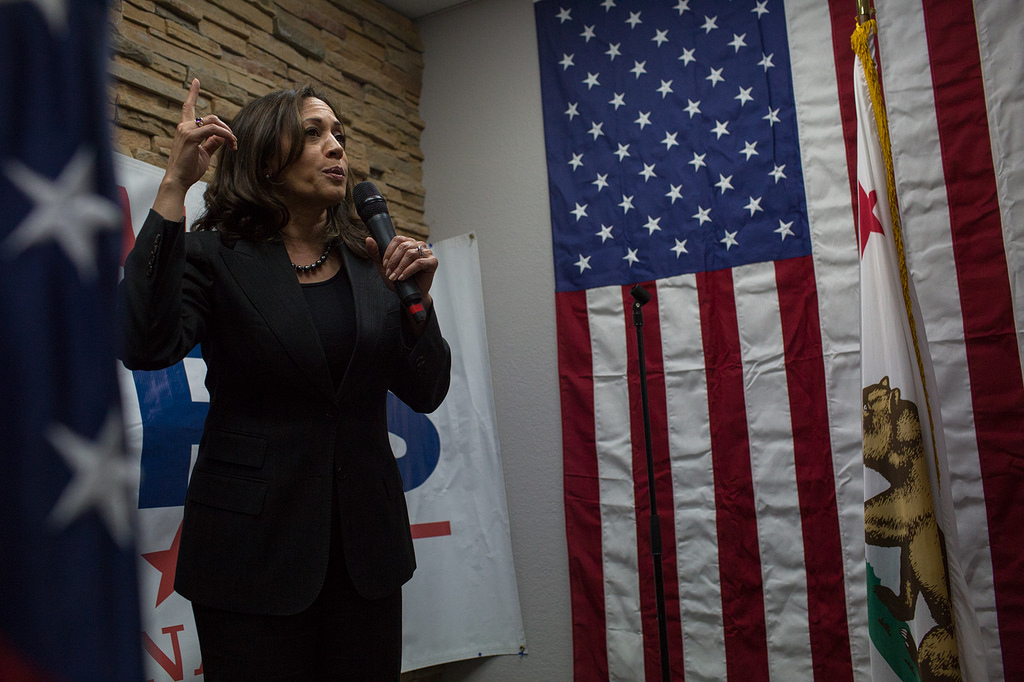It’s hard to assign a firm cause and effect to it, but Kamala Harris’s presidential candidacy has been in a steady decline ever since she challenged Joe Biden over his opposition to federally-mandated student busing and work with segregationist Democrats in the 1970s. Initially, the reviews suggested that Harris had the better of that exchange, but there’s been no subsequent data to support that contention. If she did any damage to Biden at all, it seems that other contenders were the beneficiaries.
Harris huddled with top campaign officials Tuesday in Baltimore to discuss the next steps as a series of polls show her plummeting into the mid-single digits. She’s not expected to significantly alter her message. Instead, Harris is planning to make weekly visits to [Iowa] and nearly double the size of her 65-person ground operation, sources familiar with the discussions told POLITICO.
Iowa’s first-in-the-nation status creates a conundrum for candidates of both parties in every cycle in which an incumbent president isn’t in the running. It’s almost insignificant in the raw number of delegates it offers, and the caucuses only loosely determine how those delegates will eventually be allocated. A poor performance, nonetheless, can be fatal. It’s probably more important to do better than expected than it is to win outright because Iowa is almost exclusively a perceptions game. For this reason, if you’re going to lose badly, there is a decent incentive to create the impression in advance that you weren’t even trying to contest the state. The worst of all worlds is to put all your chips on Iowa and then get a bad result.
But that’s the risk Harris is taking.
“I’m f****** moving to Iowa,” Sen. Kamala Harris joked to Sen. Hirono (before she noticed me) pic.twitter.com/dv0PRWLY8g
— Matt Laslo (@MattLaslo) September 18, 2019
By confiding (a little too loudly) to Senator Mazie Hirono of Hawaii that she’s “fucking moving to Iowa,” Harris inadvertently disclosed that her strategy now depends on getting a good result there. Another option would be to suggest to the nation that it’s not an optimal state for her, and thereby lower expectations. She could tell everyone that she’s putting her chips on New Hampshire. In truth, though, neither state is ideal for her.
Iowa and New Hampshire are among the least racially diverse states in the nation. At least in Iowa, Harris does not have to contend with two of the three frontrunners (Bernie Sanders of Vermont and Elizabeth Warren of Massachusetts) representing bordering states.
Harris’s decision looks logical even if it’s a bit forced. The third contest is the Nevada caucuses, but they have historically not had influence in the perceptions game. Harris’s best early state is likely South Carolina, where there is a huge African-American population that has tremendous influence in the Democratic primary. But Joe Biden is dominating in the polls there and that’s unlikely to change (or benefit Harris if it does) if she does poorly in the first three contests.
She needs a win before South Carolina, or at least a much-better-than-expected result that gives people a reason to see her as a real option. Iowa is probably her best bet for accomplishing that.
If so, I’d advise her to do more than “move” there. She should adjust her message and even some of her proposals to fit the Hawkeye State. She should run for president of Iowa to the exclusion of pretty much everywhere else. She won’t likely survive to seriously contest another state if she doesn’t come in at least a strong third place there, so all her efforts will be wasted if she trims her sails or holds things in reserve out of consideration for future contests or the general election.
She should also not be shy about admitting the obvious. She should acknowledge that she’s putting it all on the line in Iowa. Lowering expectations isn’t going to help her continue on if she doesn’t do well.
This is where her likelihood of success is really low, in my estimation. So low, in fact, that I would have counseled against this strategy in favor of something that I think has a slightly better chance of working. Better to really lower expectations for the first three contests and “move” to South Carolina with the idea of trying to take second place there. Let the field get winnowed down and hope that Biden falters a bit, which would make her start to look more attractive as an alternative to Warren or Sanders, whichever emerges stronger going into South Carolina.
California is the biggest prize in the Super Tuesday contest after South Carolina, and she might have a chance of coming out of that day with the biggest win.
I suspect that fundraising considerations precluded her from taking this strategy. Without early wins, she probably wouldn’t have the money to campaign through Super Tuesday. Yet, even acknowledging that hurdle, I see it as a modestly better bet than putting everything on Iowa.
In any case, it’s too late to change now. Pursuing my strategy is premised on conspicuously not competing in Iowa.



